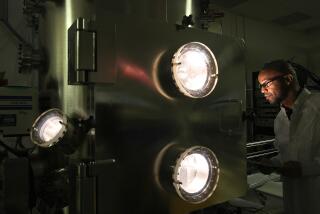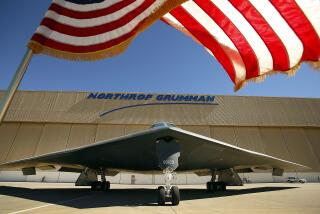Pico Rivera B-2 Plant to Stay Open Past ’97 : Aerospace: Northrop Grumman says its composite and software equipment will be needed longer than expected.
In a key decision for Southern California’s aerospace industry, Northrop Grumman Corp. announced Monday that it has changed its plan to close its B-2 stealth bomber plant in Pico Rivera in 1997, saying it will keep the sprawling facility open at least two additional years.
Although the decision does not affect current jobs, as Northrop had planned to transfer most of the 4,700 Pico Rivera workers to sites in Palmdale or Hawthorne, it means the plant will stay a crucial part of Southern California’s industrial landscape.
If Northrop wins additional B-2 orders, as appears increasingly likely after Congress took action this year to provide $493 million for future bomber production, the Pico Rivera plant could remain active well into the next decade.
As the pace of defense downsizing nationwide has quickened, the survival of industrial plants is becoming an important factor in determining which regions will emerge as the leading aerospace centers in the next century.
Until recently, it appeared that Southern California was making a quick exit from the defense business, having lost half a dozen major plant complexes despite boasting of one of the largest and most highly trained labor forces in the country.
But in the last two years, the region has reversed course and has held on to facilities that had appeared headed out of state or destined for a simple shuttering as federal funding dried up.
“We feel really good,” said Ralph D. Crosby Jr., Northrop’s B-2 general manager. “At the human level, this is good news.”
Indeed, employees who had faced the prospect of a grueling commute to Palmdale or Hawthorne from homes near Pico Rivera were relieved by the announcement and hopeful that it augurs well for their long-term job security.
Jacquelyn Bunton, a 22-year Northrop veteran, said the decision might give workers an opportunity to “further our children’s education, pay bills and to have a more stable existence in this country.”
The broad economic consequences are enormous. Pico Rivera has lost 28% of its tax revenues in recent years, making Northrop’s $1.5 million in annual license fees all the more critical for the city.
About $7 million in road and sewer repairs have been deferred, Pico Rivera Mayor Garth G. Gardner said. “The Northrop decision is a lifesaver,” Gardner said in an interview.
The 215-acre site was originally developed by Ford Motor Co. in the 1950s for automobile assembly. When Northrop acquired it in the early 1980s, it became the nation’s most secret military industrial facility.
Compared with the World War II-era plants that many of its competitors were operating, the facility was among the most modern aerospace plants in the nation, and it looked as if it would remain active for decades. The announcement two years ago that it would be closed reflected the drastic changes wrought by end of the Cold War.
Northrop said then that the plant would not be needed after the last B-2 rolled out of the firm’s assembly plant in Palmdale in 1998. Northrop had no other programs for the high-cost facility.
Crosby said the decision to keep the Pico Rivera plant open was based only on a reassessment of the current production contract and not on a bet on future orders. The facility’s composite and software equipment will be needed longer than expected, he said.
Nonetheless, he added, the facility does provide the firm with some measure of flexibility should the firm land a contract for additional bombers.
Earlier this month, Congress appropriated $493 million for initial production of parts for an unspecified number of future bombers. Northrop has proposed building 20 additional bombers for $15 billion, a proposal that has gained widespread political support.
Last week, the House approved a 1996 defense authorization act that lifts restrictions that held B-2 production to the 20 initial aircraft and capped total spending.
The Senate will vote on that measure this week. President Clinton has threatened a veto, but in an important signal, he made no mention of the B-2 program as being one of his objections.
The Pentagon has insisted that it can not afford more B-2s, but pundits expect that the Clinton Administration will reverse itself on the B-2 issue as presidential elections draw near next year.







